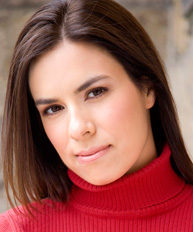'A priest is like Mary Poppins'Posted May 30, 2012 |
|
[Episcopal News Service] The other day, someone asked me what a priest does.
“Do you officiate weddings and funerals every day?” she asked. “Or pray all the time? What exactly is it that you do?”
It’s a common question from churchgoers and non-churched folk alike: What is this work to which a priest is called?
Initially, I responded to my friend with a laundry list of priestly responsibilities, but about somewhere between, “Baptize newcomers,” and “Dredge the church basement if it leaks,” her eyes glazed over. Then it came to me, the perfect metaphor for who a priest is and what a priest does.
“A priest is like Mary Poppins,” I said, and then I explained what I meant.
At the beginning of Mary Poppins, Mr. and Mrs. Banks lose the last in a string of nannies unable to control their children, Jane and Michael. Mr. Banks pens a list of characteristics needed in a caretaker—ordered, disciplined, rule-abiding—while his children want someone who will “love us like a son and daughter, and never smell of barley water.”
George Banks rips the children’s list up and throws it into the fireplace, where its shredded pieces ascend to the sky and reach the hands of Mary Poppins, who literally blows the other potential nannies away in order to get the job.
Priests do the same thing: They listen for the messages discarded in the fireplaces of our lives. They listen for what’s not said and seek overlooked opportunities for growth. Then they issue a call for that growth, though their people might be surprised to hear it. In that way, like Mary Poppins, they are prophetic voices, speaking with a vision that might seem unexpected.
As the plot develops, Mary Poppins takes the children on a series of magical journeys: They snap their fingers to clean up, jump into a street drawing for an adventure with penguins, and drink tea while floating in midair. Each fantastical event presses against Jane’s and Michael’s way of being in the world, not so much because of magic as because Jane and Michael discovered lessons they need to know.
This is the second thing priests do. Guided by the Holy Spirit, they create opportunities where transformation occurs: in the Church’s liturgy, in the sacraments, in educational and mission programs. In those spaces, all of God’s children can discover something new about their relationship to Jesus and how they can help create a world without pain and suffering.
Then the plot thickens. Mr. Banks treasures his work responsibilities above spending time with his children—who desperately want to fly a kite with him—so Mary Poppins convinces him to take his children to work. On the way, Michael tries to give his money to the bird lady who sits on the steps of St. Paul’s rather than invest it in the bank where his father works, making such a fuss that Mr. Banks loses his job. But at his lowest moment, mortified by his job loss, humiliated in front of his colleagues, this father finds himself thinking the way Mary Poppins does. He begins to laugh, and in that laughter, finds healing.
So at the end of the film, George Banks comes home shamed by his colleagues but with a mended kite in his hand. His priorities restored, he takes his children to the park, where they fly that kite together, finally united as a family.
In that image, one discovers the third thing priests do: They watch as the kites of people’s lives break, seemingly beyond repair. They listen to the anguish of husbands whose wives died too young, of parents who lost children, of those with addictions, who are hopeless or homeless, sorrowful or sick. They hold all those experiences in their hearts, all the while believing and teaching the hope Jesus offers: that suffering never has the final word; that death is not more powerful than love; that those broken kites will fly again. And by doing this work in God’s name, their ministry becomes about the divine, not about themselves.
As the story of the Banks family concludes, Mary Poppins remains apart from them, standing on the doorstep with her carpetbag in hand, and the parrot on her umbrella speaks:
“That’s gratitude for you, didn’t even say goodbye,” he says.
“No, they didn’t,” she says.
“Look at them,” he says. “You know, they think more of their father than they do of you.”
She smiles. “That’s as it should be.”
Then Mary Poppins flies away, her feet in first position, ready for the next ripped-up note that crosses her path. She is once again ready to perform her calling. One can only imagine that she continues to be a conduit through which the visionary and prophetic speak, through which the miraculous can be experienced, and through which the broken are empowered to soar—work that is, curiously enough, the calling of a priest.
– The Rev. Danielle Tumminio lectures at Yale University and is the author of God and Harry Potter at Yale. She currently serves as an interim associate at St. Anne in-the-Fields Episcopal Church in Lincoln, Massachusetts.
Statements and opinions expressed in the articles and communications herein, are those of the author(s) and not necessarily those of Episcopal News Service or the Episcopal Church.


Social Menu